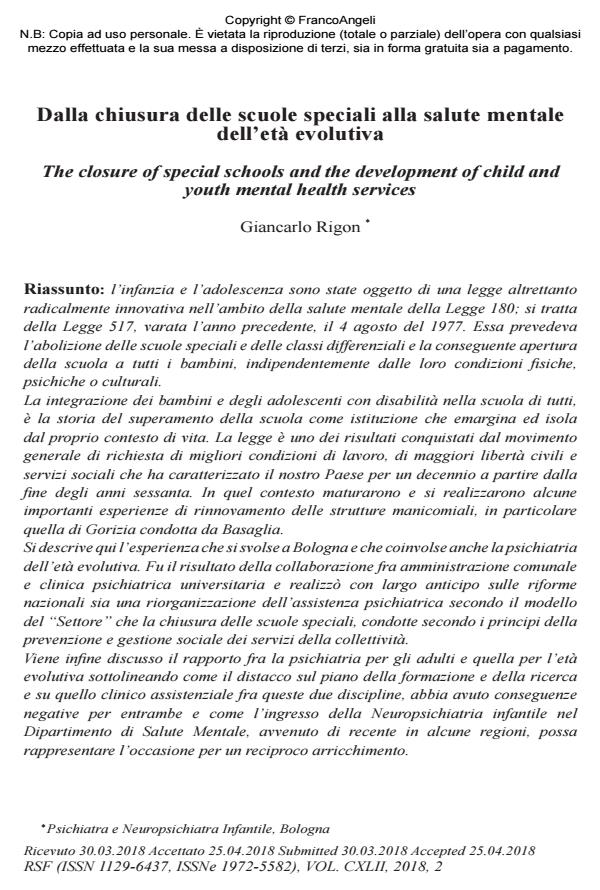Dalla chiusura delle scuole speciali alla salute mentale dell’età evolutiva
Titolo Rivista RIVISTA SPERIMENTALE DI FRENIATRIA
Autori/Curatori Giancarlo Rigon
Anno di pubblicazione 2018 Fascicolo 2018/2
Lingua Italiano Numero pagine 16 P. 89-104 Dimensione file 1828 KB
DOI 10.3280/RSF2018-002008
Il DOI è il codice a barre della proprietà intellettuale: per saperne di più
clicca qui
Qui sotto puoi vedere in anteprima la prima pagina di questo articolo.
Se questo articolo ti interessa, lo puoi acquistare (e scaricare in formato pdf) seguendo le facili indicazioni per acquistare il download credit. Acquista Download Credits per scaricare questo Articolo in formato PDF

FrancoAngeli è membro della Publishers International Linking Association, Inc (PILA)associazione indipendente e non profit per facilitare (attraverso i servizi tecnologici implementati da CrossRef.org) l’accesso degli studiosi ai contenuti digitali nelle pubblicazioni professionali e scientifiche
L’infanzia e l’adolescenza sono state oggetto di una legge altrettanto radicalmente innovativa nell’ambito della salute mentale della Legge 180; si tratta della Legge 517, varata l’anno precedente, il 4 agosto del 1977. Essa prevedeva l’abolizione delle scuole speciali e delle classi differenziali e la conseguente apertura della scuola a tutti i bambini, indipendentemente dalle loro condizioni fisiche, psichiche o culturali. La integrazione dei bambini e degli adolescenti con disabilità nella scuola di tutti, è la storia del superamento della scuola come istituzione che emargina ed isola dal proprio contesto di vita. La legge è uno dei risultati conquistati dal movimento generale di richiesta di migliori condizioni di lavoro, di maggiori libertà civili e servizi sociali che ha caratterizzato il nostro Paese per un decennio a partire dalla fine degli anni sessanta. In quel contesto maturarono e si realizzarono alcune importanti esperienze di rinnovamento delle strutture manicomiali, in particolare quella di Gorizia condotta da Basaglia. Si descrive qui l’esperienza che si svolse a Bologna e che coinvolse anche la psichiatria dell’età evolutiva. Fu il risultato della collaborazione fra amministrazione comunale e clinica psichiatrica universitaria e realizzò con largo anticipo sulle riforme nazionali sia una riorganizzazione dell’assistenza psichiatrica secondo il modello del "Settore" che la chiusura delle scuole speciali, condotte secondo i principi della prevenzione e gestione sociale dei servizi della collettività. Viene infine discusso il rapporto fra la psichiatria per gli adulti e quella per l’età evolutiva sottolineando come il distacco sul piano della formazione e della ricerca e su quello clinico assistenziale fra queste due discipline, abbia avuto conseguenze negative per entrambe e come l’ingresso della Neuropsichiatria infantile nel Dipartimento di Salute Mentale, avvenuto di recente in alcune regioni, possa rappresentare l’occasione per un reciproco arricchimento.
Parole chiave:Salute mentale dell’età evolutiva, scuole speciali, Legge 180.
- [1] Saraceno B. Discorso globale, sofferenze locali. Analisi critica del Movimento di salute mentale globale. Milano: Il Saggiatore; 2014.
- [2] Ancona A, Barbagli M, Capecchi V, Loperfido E, Malservisi C, Palmonari A, et al. La dimensione politica del ‘disadattamento’ nell’infanzia, Psicoterapia e Scienze Umane; 1970; 4 (13/14): 1-18.
- [3] Milani L. Lettera a una professoressa. Firenze: Libreria Editrice Fiorentina; 2017. (Ed. or., 1967).
- [4] Marcuse H. Eros e civiltà. Torino: Einaudi; 2001. (Prima edizione italiana: 1964. Ed. or. 1955).
- [5] Marcuse H. L’uomo a una dimensione. Torino: Einaudi; 1999. (Prima edizione italiana: 1967. Ed. or. 1964). [6] Foucault M. Storia della follia nell’età classica. Milano: Rizzoli; 2011. (Prima edizione italiana: 1963. Ed. or. 1961).
- [7] Gabel J. La falsa coscienza. Bari: Dedalo; 1967. (Ed. or. 1962).
- [8] Goffman E. Asylums. Le istituzioni totali: i meccanismi dell’esclusione e della violenza. Torino: Einaudi; 2010. (Prima edizione italiana: 1968. Ed. or. 1961).
- [9] Laing R. L’Io diviso. Studio di psichiatria esistenziale. Torino: Einaudi; 1969. (Ed. or. 1955).
- [10] Cooper D. ed. Dialettica della liberazione. Integrazione e rifiuto nella società opulenta. Torino: Einaudi; 1969. (Ed. or. 1968).
- [11] Mitscherlich A. Verso una società senza padre. Milano: Feltrinelli; 1970. (Ed. or. 1963).
- [12] Basaglia F. ed. L’istituzione negata. Rapporto da un ospedale psichiatrico. Milano: Baldini Castoldi Dalai editore; 2010. (Ed. or. 1968).
- [13] Merini A, ed. Psichiatria nel territorio. Rendiconti di un’esperienza. Milano: Feltrinelli; 1977.
- [14] Galli PF. Editoriale. Psicoterapia e Scienze Umane 1967; 1:1.
- [15] Loperfido E. L’infanzia, nodo politico attuale della società in trasformazione, Psicoterapia e Scienze Umane, 1969; 10: 1-9.
- [16] Gentili C. Prefazione, In Merini A, ed. Psichiatria nel territorio. Rendiconti di un’esperienza. Milano: Feltrinelli; 1977.
- [17] Merini A. Base logica dell’intervento terapeutico. In Merini A, ed. Psichiatria nel territorio. Rendiconti di un’esperienza. Milano: Feltrinelli; 1977.
- [18] Marzotto M. Intervento a livello degli anziani. In Merini A., ed. Psichiatria nel territorio. Rendiconti di un’esperienza. Milano: Feltrinelli; 1977.
- [19] Melega M, Merini A, Rigon G. Prime esperienze di una équipe psichiatrica infantile. In Merini A, ed. Psichiatria nel territorio. Rendiconti di un’esperienza. Milano: Feltrinelli; 1977.
- [20] Rigon G. Presa in carico terapeutica e riabilitazione psichiatrica in età evolutiva. Psichiatria dell’Infanzia e dell’Adolescenza 2011; 78 (2): 303-313.
- [21] Ferrannini L, Rigon G. Psichiatria degli adulti e psichiatria dell’ età evolutiva. Note su percorsi e riferimenti culturali. In: Diavoletto A, Rigon G, ed. Psichiatria dell’adolescente. Aspetti clinici e metodologici della transizione. Roma: Aracne editrice; 2017. p. 15-24.
- [22] Cicchetti D, Cohen D. J. Developmental Psychopathology. Theory and Method. New York: John Wiley & Sons; 2006.
- [23] Rigon G. Dimensione clinica ed esistenziale nel percorso diagnostico in psichiatria dell’età evolutiva. Giornale di Neuropsichiatria dell’Età Evolutiva 2011; 31, (Suppl. 1): 9-16.
Giancarlo Rigon, Dalla chiusura delle scuole speciali alla salute mentale dell’età evolutiva in "RIVISTA SPERIMENTALE DI FRENIATRIA" 2/2018, pp 89-104, DOI: 10.3280/RSF2018-002008